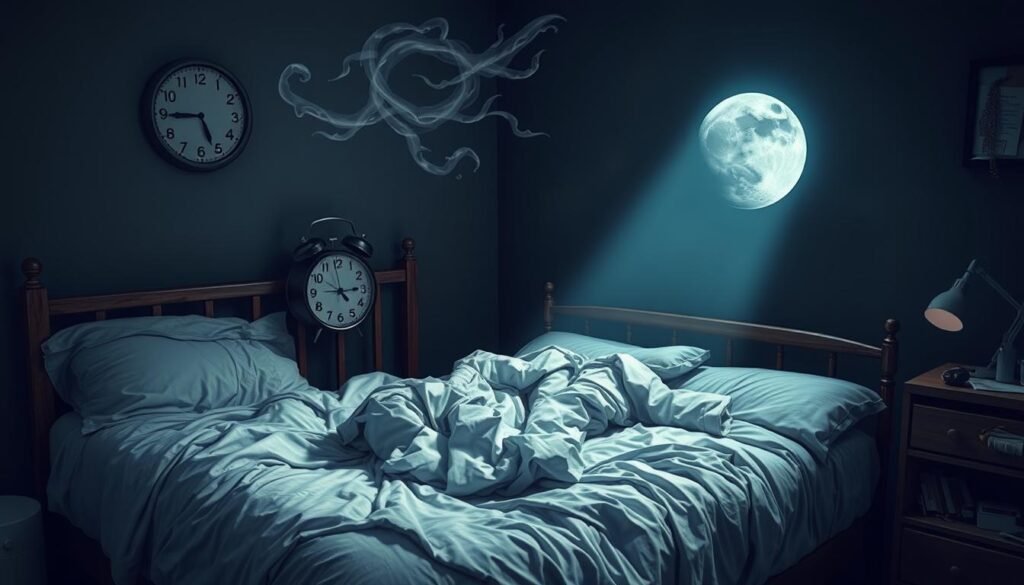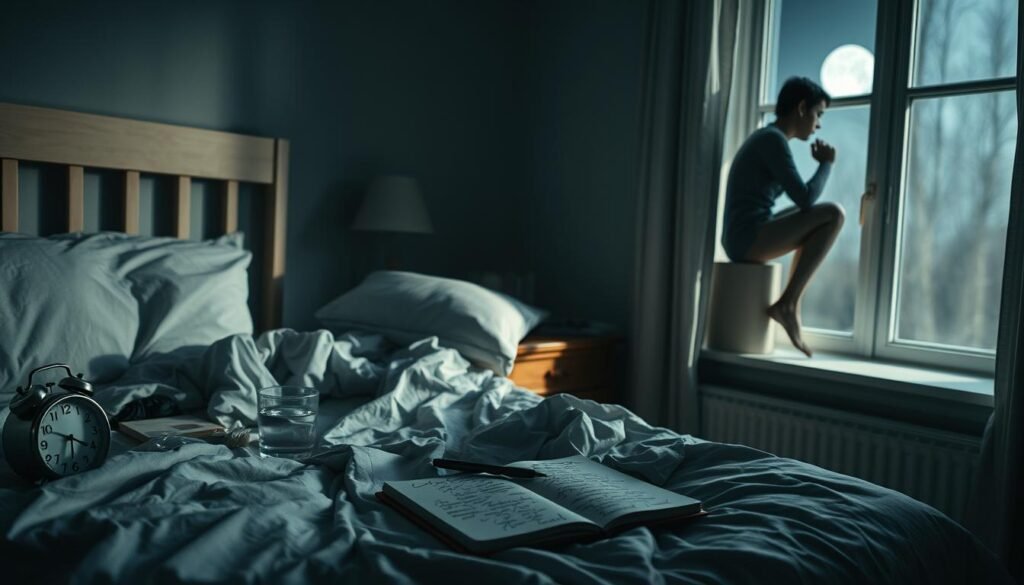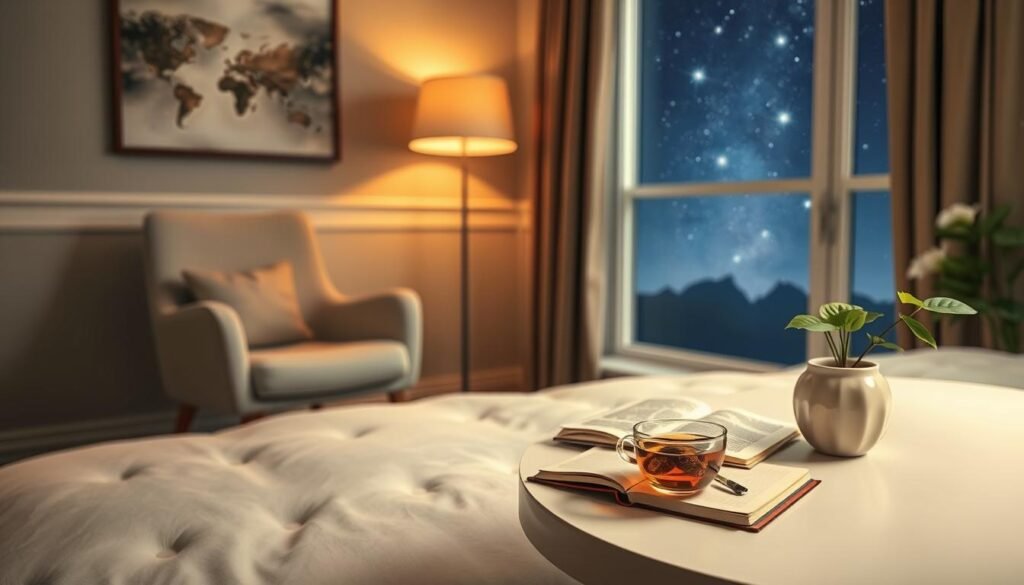Did you know that roughly 20% of adults in America have anxiety disorders? This makes it the most common mental health issue. Impact of anxiety on sleep quality is significant. For those dealing with anxiety, sleeping well can be hard. Poor sleep then makes their anxiety worse, leading to problems like insomnia.
This guide looks closely at how anxiety messes with sleep and causes insomnia. About 6.8 million people suffer from Generalized Anxiety Disorder alone. We’ll talk about symptoms and how common these issues are. Plus, we’ll show ways to fight back against anxiety, insomnia, and bad sleep. For more on how anxiety and sleep affect each other, look at this informative resource.
Key Takeaways
- About 20% of American adults experience anxiety disorders, significantly affecting sleep quality.
- Anxiety can lead to various sleep disturbances, particularly insomnia.
- The relationship between anxiety and sleep is bidirectional, influencing one another.
- About 10.5% of adults may be at high risk for insomnia due to anxiety.
- Effective sleep hygiene and relaxation techniques can help manage anxiety-related sleep issues.
What Is Anxiety?
Anxiety is a strong, constant worry that messes with how we do everyday things. It shows up in different ways and can turn into serious anxiety problems. Understanding these issues helps us see how anxiety affects our health.
Understanding Anxiety Disorders
Almost 20% of adults in the United States struggle with anxiety disorders. This makes them the most common mental health problem. Disorders like Generalized Anxiety Disorder (GAD) and Panic Disorder cause a lot of stress. They make people avoid certain situations and struggle with work and making friends.
Common Symptoms of Anxiety
It’s important to know the signs of anxiety. Catching them early can help. They include:
- Worrying a lot about different things
- Feeling irritable and having mood changes
- Having tense muscles and discomfort
- Struggling to focus and feeling restless
Knowing these signs helps figure out if someone has an anxiety disorder. Getting help fast is key. Not sleeping enough can make anxiety worse and hurt mental health.
| Symptom | Description |
|---|---|
| Excessive Worry | Always being worried about small or big things, more than what seems normal. |
| Irritability | Getting upset easily over small problems or matters. |
| Muscle Tension | Feeling your muscles are always tight, which can be painful. |
| Difficulty Concentrating | Having a hard time staying focused or making choices, affecting work or studies. |
The Relationship Between Anxiety and Sleep
Understanding how anxiety and sleep affect each other is crucial. Anxiety can make it hard to get good sleep. This, in turn, can lead to even more anxiety, making it a tough cycle to break.
By knowing how these two issues connect, we can better manage them.
The Bidirectional Nature of Anxiety and Sleep
Many Americans struggle with stress that affects their sleep. Anxiety and trouble sleeping, like insomnia, often go hand in hand. This issue is significant, with around 36% of people with anxiety also facing sleep problems.
Anxiety can lead to poor sleep, including nightmares. This makes overall sleep quality drop over time.
Understanding Sleep Architecture
The pattern of our sleep, known as sleep architecture, is crucial. It includes different types of sleep, like REM and non-REM. People with anxiety often see big changes in their sleep patterns.
A 2021 study showed improving sleep can greatly help with anxiety, depression, and stress. This highlights the importance of good sleep.
| Factor | Statistics |
|---|---|
| Percentage of Americans losing sleep due to stress | Approximately 66% |
| Incidence of insomnia among those with anxiety disorders | 36% |
| Poor sleep quality among healthcare students | 80.3% |
| Average sleep duration reported by college students | 6.81 hours |
| Correlation between sleep quality and anxiety | r = 0.387 |
Impact of Anxiety on Sleep Quality
Anxiety and sleep quality are closely connected. Anxiety can change the way we sleep and often causes sleep problems. There’s plenty of evidence that people with anxiety might have trouble sleeping well. This can make their emotional pain worse. Knowing how anxiety affects sleep can help people find ways to sleep better.
The Effects of Anxiety on Sleep Patterns
Studies show that anxiety can disturb sleep in many ways. It can make it hard to fall asleep or stay asleep. People with anxiety might wake up often or feel restless at night. This impacts sleep quality a lot. Bad sleep can make anxiety worse, making it a tough cycle to break.
Anxiety-Induced Sleep Problems and Insomnia
Insomnia is a common problem for people with anxiety. It affects many people. Anxiety can cause sleep disorders in up to 85% of some groups. This shows how widespread the problem is. People with anxiety may have a lot of trouble sleeping. This can lead to not getting enough sleep. Studies say that poor sleep and higher anxiety are linked, especially in older adults and those with certain health conditions.
Types of Anxiety Disorders and Their Sleep Disruptions
Various anxiety disorders affect sleep in different ways. Knowing this can help us find better ways to improve sleep and well-being.
Generalized Anxiety Disorder (GAD) and Sleep Disturbances
GAD makes people worry a lot and overthink. This can make sleeping hard, as falling or staying asleep becomes tough. Many adults, around one-third, struggle with insomnia symptoms because of GAD.
Those with this disorder often feel very tired during the day. It lowers how much they can do.
Panic Disorder and Its Effect on Sleep Quality
Panic Disorder causes unexpected challenges. People might have panic attacks that stop them from sleeping well. The fear of these attacks can make someone not want to sleep at all.
This can lead to a cycle of bad sleep and more anxiety. Nearly 34% of Americans say their sleep isn’t good, showing how widespread the issue is.
Sleep Issues Related to PTSD and Other Anxiety Disorders
PTSD is closely linked to sleep problems, like insomnia and bad dreams. About 90% of people with PTSD have trouble sleeping. This shows how important it is to tackle both PTSD and sleep problems together.
Insomnia affects 42-63% of those with anxiety and mood disorders. This highlights the need for sleep treatments that focus on both issues.

| Anxiety Disorder Type | Common Sleep Issues | Percentage Affected |
|---|---|---|
| Generalized Anxiety Disorder (GAD) | Insomnia, difficulty falling/staying asleep | ~34% |
| Panic Disorder | Panic attacks disrupting sleep cycles | ~34%-50% |
| Post-Traumatic Stress Disorder (PTSD) | Nightmares, insomnia | ~90% |
Knowing about these anxiety disorders is crucial for tackling sleep problems. The link between anxiety and sleep creates a tough cycle. Treating both anxiety and sleep issues needs a detailed plan.
How Anxiety Affects Sleep Cycles
Anxiety has a big impact on how well we sleep. It changes how long and well we sleep each night. Studies show that high anxiety can mess up our normal sleep patterns. This leads to less deep sleep and more time awake.
This issue can lower the quality of sleep and make anxiety worse. It starts a cycle that’s hard to break.
The Role of Sleep Stages and Anxiety
Anxiety and sleep stages have a complicated relationship. Anxiety disturbs important sleep stages, like rapid eye movement (REM) and non-REM (NREM) sleep. This can prevent restful sleep. For instance, not enough NREM sleep can make anxiety worse.
Those who can’t sleep well may find their anxiety keeps them from moving smoothly through sleep stages. This results in worse sleep. But, using good sleep habits and cognitive behavioral therapy (CBT) can improve sleep quality.
| Sleep Stage | Effect of Anxiety | Impact on Sleep Quality |
|---|---|---|
| REM Sleep | Increased awakenings | Reduced emotional processing |
| NREM Sleep | Decreased slow-wave sleep | Less restorative sleep |
| Deep Sleep | Shorter duration | Heightened anxiety levels the next day |
Methods like mindfulness meditation and relaxing muscles step-by-step can improve sleep. Mindfulness helps us live in the moment and manage anxiety better. This improves sleep quality.
Identifying Anxiety-Related Sleep Issues
Spotting signs of anxiety-related sleep issues is key to one’s health. Many people struggle with insomnia, restless sleep, and bad dreams. It’s vital to recognize and tackle these sleep problems.
Common Sleep Disturbances Caused by Anxiety
Anxiety can disrupt sleep in many ways. Some common issues include:
- Insomnia: Hard to fall or stay asleep.
- Restless sleep: Waking up often during the night.
- Nightmares: Scary dreams that disturb sleep.
- Excessive daytime sleepiness: Feeling very tired during the day because of poor sleep.
Assessing Your Sleep Quality
Checking sleep quality is crucial for dealing with anxiety-related sleep problems. Tools like the Pittsburgh Sleep Quality Index (PSQI) help understand sleep habits and issues. About 68.94% of people with anxiety face sleep troubles. This highlights the need for awareness and action.
Here’s a table showing different factors affecting sleep quality:
| Factor | Impact on Sleep |
|---|---|
| Age | Older adults often have more trouble staying asleep. |
| Gender | There are big differences in sleep issues reported by different genders. |
| Education Level | Sleep quality assessment can vary with one’s level of education. |

Effective Strategies to Improve Sleep Quality with Anxiety
For those dealing with anxiety, finding ways to sleep better is key. Starting with good sleep habits and relaxation tricks can make a big difference. They help ease restlessness and boost well-being.
Good Sleep Hygiene Practices
Improving sleep starts with good hygiene habits. This includes routines and the right environment. Here are important steps:
- Establish a consistent sleep schedule by going to bed and waking up at the same time daily.
- Create a comfortable sleep environment, ensuring that the bedroom is cool, dark, and quiet.
- Limit screen time at least an hour before bed to reduce blue light exposure, which disrupts melatonin production.
- Avoid heavy meals, caffeine, and alcohol close to bedtime, as these can interfere with sleep patterns.
- Incorporate physical activity into the daily routine but try to complete workouts several hours before sleeping.
Relaxation Techniques for Better Sleep
Adding relaxation methods can help lower anxiety and improve sleep. These techniques relax your mind and body, making sleep easier.
- Deep breathing exercises: Slow, deep breaths can reduce heart rate and bring calmness.
- Mindfulness meditation: Staying in the present moment lessens anxiety and nighttime worries.
- Progressive muscle relaxation: Tightening and then releasing each muscle group helps relieve body stress.
- Listening to calming music: Studies show that soft music can better sleep quality for older adults.
Focus on sleep hygiene and add relaxation techniques into your day. This can help you sleep better while handling anxiety. Building these habits sets the stage for peaceful nights and refreshing sleep.
| Practice | Details |
|---|---|
| Consistent Sleep Schedule | Going to bed and waking up at the same time fosters a stable sleep cycle. |
| Comfortable Sleep Environment | Cool, dark, and quiet settings enhance the likelihood of falling asleep. |
| Screen Time Limitation | Avoiding screens before bed helps maintain melatonin levels. |
| Relaxation Techniques | Practices like deep breathing and meditation alleviate anxiety. |
Seeking Professional Help for Anxiety and Sleep Disturbances
If you’re dealing with anxiety and sleep issues, getting professional help is crucial. Mental health experts offer different methods to manage anxiety and better your sleep. These strategies are meant to reduce symptoms and help you deal effectively with your condition.
Therapies and Treatments Available
Cognitive Behavioral Therapy (CBT) is really effective for anxiety and chronic insomnia. Harvard Medical School found that CBT is often more effective than sleep drugs. Structured CBT programs, lasting 5 to 8 sessions, focus on improving sleep by changing bad thought patterns and behaviors.
After CBT, people usually find falling and staying asleep easier. These improvements can last for a year post-treatment.
- Sleep Restriction Therapy (SRT)
- Stimulus Control Therapy
- Improving Sleep Environment and Hygiene
- Relaxation Training
- Mindfulness Meditation
Behavioral methods are key in sleep therapy, provided through one-on-one, group, or online sessions. Each treatment is customized to tackle the specific reasons and symptoms of your sleep issues.
The Importance of Consulting a Healthcare Provider
Seeing a healthcare provider for a proper diagnosis and treatment plan is vital. Anxiety can show up as constant worry or feeling on edge, worsening sleep problems. This creates a vicious cycle making anxiety symptoms even stronger. Healthcare professionals can tailor treatments that may include medication, therapy referrals, and changes in behavior to boost your sleep and lower anxiety. For anyone struggling with anxiety or sleep issues, it’s key to see a healthcare provider consultation for optimal results.

| Treatment Type | Description | Benefit |
|---|---|---|
| Cognitive Behavioral Therapy | Structured therapy targeting unhealthy thought patterns | Improves sleep quality and reduces anxiety influences |
| Medication Management | Adjustments to anti-anxiety or antidepressant medications | Helps stabilize mood and improve sleep patterns |
| Behavioral Techniques | Methods like relaxation training and sleep restriction therapy | Enhances sleep hygiene and reduces sleep-related anxiety |
| Group Therapy | Sessions with others sharing similar experiences | Provides support and collective strategies for coping |
Key Takeaways
It’s vital to understand how anxiety and sleep affect each other. This knowledge can help improve mental health. Anxiety and lack of sleep have a big impact on your mood and health. Studies show 50-60% of people with social anxiety disorder report trouble sleeping. We must tackle both issues together.
Understanding the Interplay Between Anxiety and Sleep
Poor sleep can make anxiety worse, forming a tough cycle to break. People with anxiety disorders often find it harder to sleep. By managing these issues, we can sleep better and reduce anxiety.
Deep sleep lowers anxiety by rearranging how our brain works. Missing even one night’s sleep can raise anxiety levels by up to 30%. Sleep problems can also slow progress in therapy for anxiety. Those with social anxiety generally sleep worse than those without it. We need to focus on treating both for better health.
Getting good sleep every night is key to fighting anxiety. Mental health treatments should assess sleep to be more effective. To learn more, check out this research here. This strategy could lead to better outcomes in both managing anxiety and improving sleep.
Conclusion
Anxiety and sleep quality are deeply linked, making a cycle that worsens both. About 10.5% of people with sleep risks face these challenges. It’s essential to manage both anxiety and sleep to prevent one from harming the other.
A lot of people with insomnia also have anxiety disorders, ranging from 24% to 36%. If you struggle with anxiety, focusing on sleep health is key. Dealing with worries and social fears helps improve sleep and mental wellness. You can learn more here.
It’s vital to know how anxiety affects sleep to live healthier. People and doctors must work together on solutions for these issues. Highlighting good sleep habits and seeking professional advice can make sleep better and relieve anxiety. This guide aims to encourage actions for a calmer and more peaceful life.